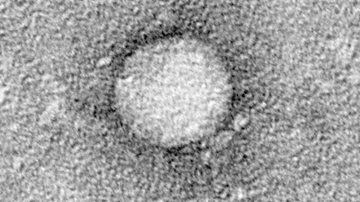Hepatitis B: Cure is the goal
The digitally-colourized transmission electron microscopic image reveals the presence of Hepatitis B virions (orange coloured).
Worldwide, approximately 260 million people suffer from chronic hepatitis B which is currently incurable. However, there is now a shimmer of hope on the horizon as scientists at the DZIF have developed a therapeutic vaccine which they intend test clinically as soon as possible. Two parties are funding this ambitious mission: the DZIF and the PoC (Proof of Concept) Initiative “Helmholtz-Fraunhofer-Hochschulmedizin”. A total of almost four million euros is flowing into this project.
Almost 880,000 people die of the consequences of hepatitis B virus infection each year, even though an effective vaccine against hepatitis B is available. Particularly in early childhood, this infection causes a chronic course of disease. While the current antiviral agents are able to curb viral replication, they are unable to cure the disease. When treatment is discontinued, the hepatitis B viruses start to replicate once again. Responsible for this is a small, circular form of viral DNA, which is deposited in the nuclei of infected liver cells allowing the viruses to survive. Even in cases of low viral loads, chronic hepatitis B bears the risk of liver cirrhosis or liver cancer. New, curative treatment approaches are therefore urgently needed.
“We have developed a therapeutic vaccine which is administered as a two-stage vaccination with the chance of curing this disease,” explains Prof Ulrike Protzer from the Technical University Munich (TUM) and the Helmholtz-Zentrum München. The scientist has already successfully conducted preclinical tests at the DZIF. Now, preparations for a first clinical trial on humans are to be initiated together with researchers from the Fraunhofer Institute for Cell Therapy and Immunology in Leipzig, the Universitätsklinikum Rechts der Isar and the University Medical Center Hamburg-Eppendorf. This project exemplifies translational product development at the DZIF.
Project selected out of 83 applications
Proof of concept, i.e. the proof of clinical effectiveness, is a critical step on the path towards the approval of drugs and vaccines. For researchers, this often poses insurmountable challenges for which reason the Fraunhofer Society, the Helmholtz Association and Deutsche Hochschulmedizin e.V. founded the PoC Initiative. The hepatitis B project was one of four projects that were granted funding out of a total of 83 applications. This is a huge success for the scientists who brought the project underway, and for the DZIF as well.
Dually effective against hepatitis B
Two different components are combined in this innovative therapeutic vaccination: in a first step (primer), specific hepatitis B proteins are used as antigens in order to trigger the development of neutralising antibodies and to prepare T cells for their task. Subsequently, the immune reaction (booster) is enhanced by means of a smallpox virus vector into which gene sequences from the hepatitis B virus have been inserted. This viral vector is to boost the development of specific T cells against the virus. T cells are important immune cells in our body, which are able to destroy virus-infected cells.
This “prime-boost vaccine” has been extraordinarily effective in preclinical models: “It resulted in a development of both neutralising antibodies, which decreased viral loads and spread, and cytotoxic T cells, which destroyed infected liver cells,” explains Protzer. “This approach is suitable for solving the problem of viral persistence and, with this, cure the disease.”
Preparations for first clinical trial underway
The scientists are now preparing the first clinical trial on humans with the granted funding. Preparations require both the correct manufacture of vaccine components and toxicological and pharmacodynamics examinations to be conducted in advance. The clinical trial is being conducted at the University Medical Center Hamburg-Eppendorf (UKE) and led by Prof Marylyn Addo who brings along with her the necessary expertise. In Hamburg, first tests on humans with the Ebola virus and the MERS coronavirus vaccines have also been conducted.
A successful therapeutic vaccine would have dual benefits, as physicians would simultaneously have at hand an effective agent against Hepatitis D. Hepatitis D causes severe liver inflammation and only occurs as a co-infection with hepatitis B.




